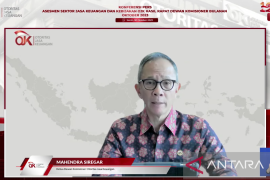This will allow Indonesia's capital market to be more stable and resilient when there is pressure from both domestic and global sources, it added.
Based on data from the Indonesia Stock Exchange (IDX), the domestic capital market capitalization as of November 12, 2021 stood at Rp8,166.56 trillion, or 50.76 percent of the GDP.
"We continue to grow. Now, it is still below 51 percent; hopefully, we can get above 70 percent like Japan, where the market is quite liquid and deep so that it can be stable and resilient," executive chairman of capital market supervisor at OJK, Hoesen, said in Jakarta on Thursday.
According to Bloomberg data, Hong Kong is the country with the largest percentage of capital market capitalization to GDP of 869.92 percent.
"If we look at developed countries, the market capitalization is already above 100 percent. In a small country like Singapore, the market capitalization is already 109 percent of the GDP. Hong Kong is extraordinary, more than 8 times its GDP. Meanwhile, Australia is 129 percent," Hoesen noted.
Meanwhile, the capital market capitalization in the United States has only reached 52 percent of the GDP because of its large population, he said. China has a capital market capitalization of 47 percent, he added.
Related news: 2.3 million new investors join capital market during pandemic
In Asia, the capital market capitalization of countries such as South Korea and Thailand is currently almost 100 percent of the GDP at 99.95 percent and 99.73 percent, respectively, he said. Meanwhile, Japan's capital market capitalization has reached 78.11 percent of the GDP, he added.
The Indonesian government had earlier projected that the state budget (APBN) deficit would reduce to 5.2–5.4 percent of the gross domestic product (GDP), or equal to Rp873.6 trillion, by the end of 2021.
The number is smaller than the initial projection in the 2021 APBN Law of 5.7 percent of the GDP or Rp1,006.4 trillion, Finance Minister Sri Mulyani Indrawati noted after a plenary cabinet meeting at the Presidential Office in Jakarta on Wednesday.
The estimated reduction is due to increasing state revenues, as Indonesia’s overall revenue has grown by 18.2 percent as of the end of October 2021, she explained.
By the end of October, tax revenue had increased 15.3 percent, while during the same period in 2020, it had contracted by 18.8 percent, the minister said.
In addition, customs revenue and non-tax state revenues (PNBP) grew by 25.5 percent and 25.2 percent, respectively, until the end of October 2021, she added.
Related news: Under-thirty young investors dominating capital market: OJK
Translator: Citro A, Azis Kurmala
Editor: Rahmad Nasution
Copyright © ANTARA 2021












